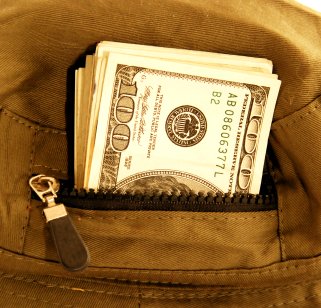 After we pull ourselves out of debt, we’ll probably want to start building wealth. It’s one of the rewards that we can offer ourselves for having overcome the debt demon. And, there’s nothing like the accumulation of wealth to put some meaningful (and visible) distance between you and your former indebtedness. If we’re going to create wealth for ourselves instead of others, I think it’s best to have our eye on that target as we start to bring ourselves out of debt. So, let’s look at what form our wealth might take.
After we pull ourselves out of debt, we’ll probably want to start building wealth. It’s one of the rewards that we can offer ourselves for having overcome the debt demon. And, there’s nothing like the accumulation of wealth to put some meaningful (and visible) distance between you and your former indebtedness. If we’re going to create wealth for ourselves instead of others, I think it’s best to have our eye on that target as we start to bring ourselves out of debt. So, let’s look at what form our wealth might take.
When it comes to building wealth, there are various approaches and any number of focal points. Here’s the first of a brief three-part series about which focal point is better, money or other more tangible items like a house, land, vehicles, or tools in the workshop.
I think the answer lies somewhere in between the two, but for today, I’m going to argue the money side of the discussion. Later, I’ll discuss why having “stuff” instead of money is good, and then I’ll present arguments to show why a balanced approach is worthwhile considering. For today, let’s focus on money.
Why might we try to accumulate money as a way of building wealth? Several reasons come to mind quite easily. Consider the following:
Easy to exchange – it’s tough to point to examples where you can’t exchange your labor, know-how, property or personal items for money. People do this all the time as employees, self-employed workers, at private sales you see in the newspaper, and at yard sales posted in your community. It’s easy to exchange something of value for money.
Comes in various forms – whether it’s paper currency, coin, a credit card, a check, an electronic transfer, a promissory note, or simply numbers on an account ledger, it all boils down to money in one form or another.
Requires little if any storage – we’re long past the days when money had to be carried around in the form of heavy coin. Just think of how small a $100 bill is in paper currency compared with 400 quarters or 1,000 dimes. It’s not hard to imagine that someone today could put the equivalent of all of their wealth on a single check.
Recognized worldwide – it basically doesn’t matter where you go in the world, your money can be exchanged for money in another country. And, you can obtain a wan, a yen, a pound, or a euro at a bank near you, without ever leaving the country, you simply exchange your dollars for whatever currency you’re interested in.
There’s very little that money won’t buy – it’s right about now I should break out into Can’t Buy Me Love by The Beatles. It’s true that money can’t buy you love, but there really isn’t much in the world that money can’t buy. Perhaps that’s why so many are willing to kill and die for it. It’s sad, but true.
It’s embedded solidly in our culture as a way of measuring value – whether it’s by law (like our fiat currency) or by custom (as demonstrated in private sales and black markets) the idea of using money as a form of measuring value is widely recognized. We know when something is overpriced because we say to ourselves, “It just isn’t worth that much.” What we’re really saying is, “I know the value of money, and that’s asking for too much of it for what I’ll get in return.”
I’m certain there are many more reasons one might choose money over other things when seeking to build wealth, but the six reasons highlighted above should be sufficient to convince many of us to follow the path of accumulating money. And, if we aren’t accumulating money, we might do well to consider other assets that are easily converted into money. They say that money makes the world go round. We know it doesn’t, but that saying wasn’t just pulled out of thin air, the phrase was coined for a reason…it’s damn near true.
Before you run off and sell all of your worldly possessions for a big pile of money, give me an opportunity in my next article to argue in favor of tangible items instead of money. It’s clear that money has an upside in many respects, but there is something to be said for having goods, materials, tools, real property, personal property and other stuff as a meaningful way of building wealth.
Not only does stuff cost $$ to begin with, it takes space (i.e., money) to store it, to maintain it, and often ultimately to trash it. And stuff sucks up our time too!
Kurt, there is definitely a downside to stuff. The one I see as most prominent is depreciation. We tend to value our stuff less and less, whereas money seems to have a more universal and sustainable appeal. Anyway, I’m promoting the idea of money and stuff in the fist two articles in this series, and then I’ll discuss the downside of each in the third edition to the series where I’ll promote a balance between the two. Clearly, both money and stuff have good points and bad points, and in any event, it’s up to us as individuals to decide what’s best for our lives when it comes to accumulating wealth.